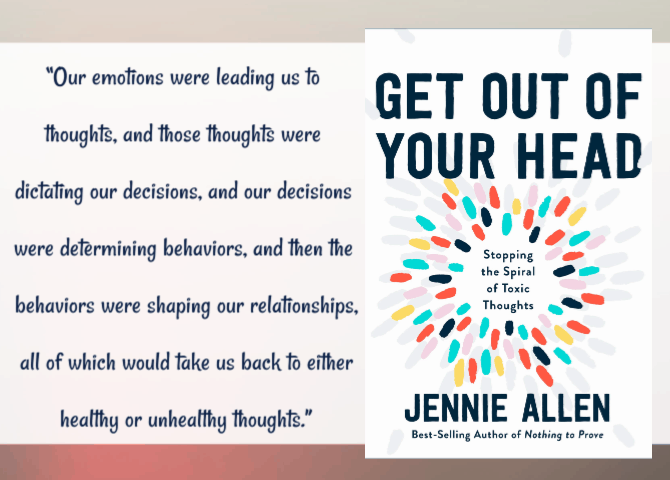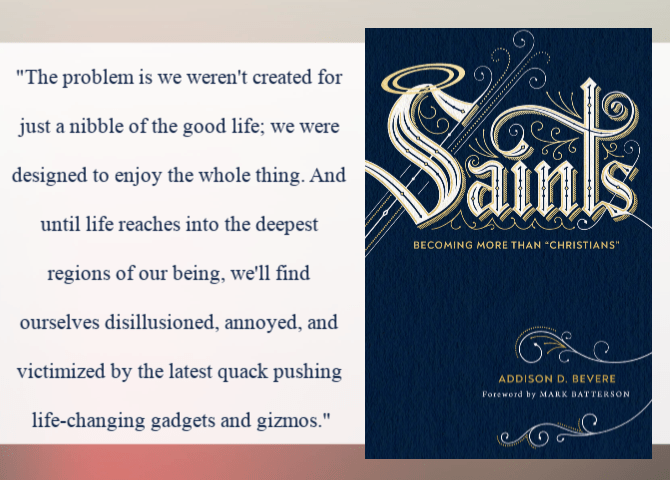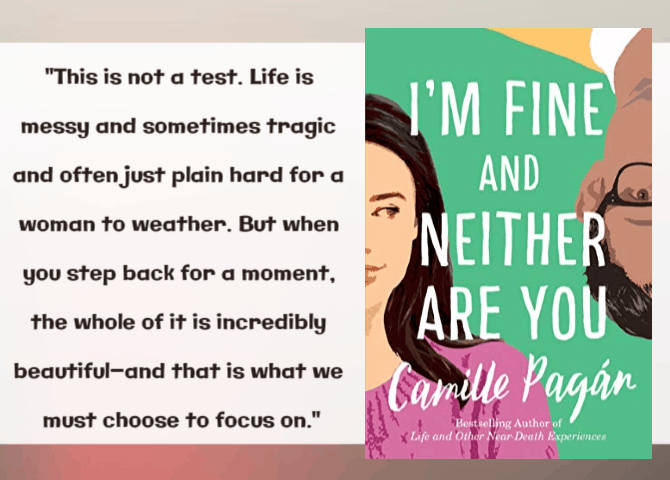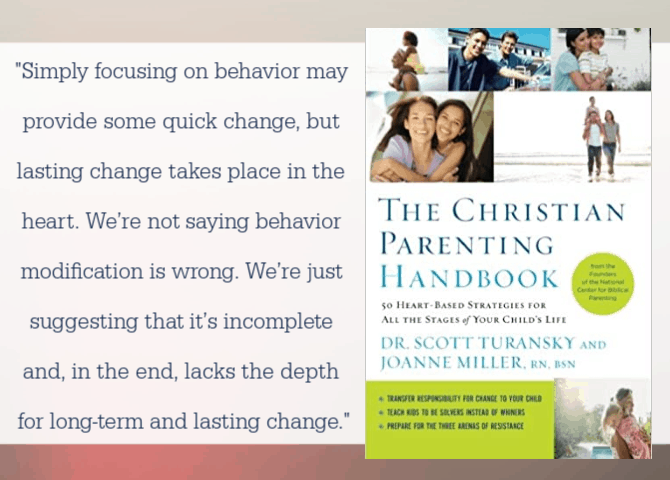I’m back today with part three of this month’s quick(ish) book reviews. Let’s dive right in!

Get Out of Your Head: Stopping the Spiral of Toxic Thoughts, by Jennie Allen: I’ve read a lot lately (most notably Don’t Overthink It and Choose Joy) about stopping spiraling thoughts in their tracks. This tells me that 1) this is a very pertinent topic for me and 2) I’m not alone in this struggle (since more and more books are coming out about this subject). In Get Out of Your Head, Jennie Allen (the founder of IF: Gathering) shares her own struggle with toxic thoughts and how they have led her down destructive paths, causing her to question her worth and even her belief in God. Jennie has learned from experience that it is possible to break free from toxic thought patterns. And because the way we think shapes how we live, it’s crucial that we learn to stop our thoughts from spinning us into anxiety, depression, and victimhood.
In Part One of this book, Jennie dives into some brain science with some enlightening (and convicting) facts about thought patterns and why it’s important that we learn to take our thoughts captive before they make us their prisoner. I appreciated the statistics in this section, and the ways that Jennie blends Biblical principals with emerging scientific information about the brain. In the second half of the book, Jennie digs into specific ways we can conquer the enemies of our minds including spending time with God, opening up to community, practicing gratitude, and serving others. While few of these strategies are original, I hadn’t thought about their connection to brain health. The chapter on community was the most revelatory for me and a good reminder for introverted me to open up to others when my thoughts are getting out of hand.
Whether or not you are someone who struggles with anxiety, depression, or other common “brain problems,” this book provides excellent tools for achieving optimal mental, emotional, and spiritual health. It’s a quick but impactful read that I highly recommend.
My Rating: 4 Stars.

Saints: Becoming More Than “Christians”, by Addison Bevere: While I have followed Lisa Bevere for a couple of years and am a big fan of her teaching, I was not familiar with her son Addison prior to hearing Annie interview him on That Sounds Fun. It was one of my favorite interviews of the year and I was deeply impressed with Addison’s grounded faith and knowledge of Scripture. I was eager to read his book, which I ended up listening to on Hoopla.
Saints is a deep dive into what it looks like to be a committed follower of Jesus. Bevere invites fellow believers to step into the identity and life God intended for us, while leaving behind the trappings of lifeless religion. Bevere uses in-depth exegesis and word studies to guide readers in an authentic pursuit of God, coming to better understand who He is (and, subsequently, who WE are as His children) so that we an fully reflect His glory.
This is a deep and thoughtful book, one that is probably best consumed in short doses. Few of the concepts were new to me, but I was fully on board with Bevere’s message and think it is one worth hearing again and again. I didn’t find the writing of this book particularly compelling, especially as it seemed to lack focus. I suspect I would have appreciated it more had I read it with my eyes and not my ears.
My Rating: 3.5 Stars.

I’m Fine and Neither Are You, by Camille Pagán: Penelope Ruiz-Kar is a working mom of two who is struggling to keep her marriage, career, family life, and finances afloat. As her household’s primary breadwinner, she is resentful towards her underemployed husband, Sanjay, who doesn’t seem to be taking his career or family responsibilities seriously. Penelope can’t help but envy her best friend, Jenny, who has a doting husband, darling daughter, lovely home, and successful blog. But when a tragedy reveals the imperfections in Jenny’s life, Penelope realizes that she needs to make some changes—beginning with her marriage.
In an attempt to rekindle the bond they once shared, Penelope and Sanjay each compose a list of three changes they would like one another to make, and they commit to radical honesty with each other as they embark on accomplishing changes within the list. But after some uncomfortable revelations, and as she is forced to confront some of her own painful shortcomings, Penelope can’t help but wonder if honesty really is the best policy . . . and also whether their marriage is already beyond saving.
As a huge advocate of intentional marriage, I loved the premise of this book. I liked that Penelope and Sanjay saw that their relationship was in trouble and developed a plan for improvement. I found both their problems—and their journey to solving those problems—incredibly relatable, especially since their relationship mirrors my own in that they have been married just over a decade and are learning to navigate marriage with young kids. In fact, many of their issues were almost TOO relatable and definitely stirred up some discomfort (but also provided a necessary mirror to some changes I need to make in my marriage).
The story is very realistic, which is probably why I didn’t particularly love it. While there is a touch of drama at the start of the novel, the remainder of the book moves slowly, with a majority of the prose dedicated to Penelope’s observations and reflections. Not exactly riveting storytelling. I wish we had been given more of a window into Jenny’s life —from the dynamic of her marriage to the pressures she experienced as a prominent “influencer.” There are also several other themes (such as authentic friendship, addiction, and mom guilt) that are touched on but could have been explored further. Ultimately, this a thought-provoking read with a lot of promise that unfortunately fails to deliver.
My Rating: 3 Stars.

God Space: Where Spiritual Conversations Happen Naturally, by Doug Pollock: A member of my Bible study small group mentioned this book recently during a discussion on evangelism, and the following week she showed up with copies for everyone in our group. Her recommendation was spot on: this is the best book I’ve read on how to share one’s faith. The book walks believers through ways we can create “God Space” in order to make room for the Holy Spirit to do amazing work through our conversations. After highlighting spiritual conversation killers (I’m guilty of so many of these!), Pollock explains how Christians can notice, serve, listen, and wonder our way into conversations with strangers, family members, and friends. He explains how to balance listening and wondering in order to move toward self-discovery and God-discovery. He also shows how we can bring the Bible into our conversations, and gives suggestions for how we can rebuild burned bridges. Finally, he provides specific conversation starters (including a guide for starting conversations with people of other cultures) and answers potential questions for those of us who are new to God-centered conversations.
This book is deeply practical, with step-by-step ideas that are illustrated through engaging stories from the author’s own spiritual conversations in various settings. I especially appreciated the incorporation of other resources to check out and Scriptures to memorize. While the book is geared toward sharing one’s faith, the principals can be applied in various other contexts: we could all benefit from becoming better listeners and noticers, and these steps pave the way for deeper connection, friendship, and trust as we dig into conversations about things that are important to us.
This is a very quick, easy read and one I know I will be returning to again and again.
My Rating: 5 Stars.

The Christian Parenting Handbook: 50 Heart-Based Strategies for All the Stages of Your Child’s Life, by Scott Turansky and Joanne Miller: “The Christian Parenting Handbook” is a pretty big title to live up to, but after hearing Scott Turansky share his wise parenting advice on Don’t Mom Alone, I was willing to give this loftily-titled tome a chance. The book builds on the premise that effective parenting needs to move beyond behavior management systems to reach a child at the heart level. This style of parenting helps develop proper motivation and healthy relationships with our kids, and it sets the groundwork for a lifetime of appropriate attitudes and behavior.
The book is divided into fifty short chapters, each dedicated to a specific parenting strategy. These include ideas such as looking for heart moments, building teamwork, and disciplining for bad attitudes. Some of these chapters address core principles (the difference between punishment and discipline) or tactics (making the decision whether or not to spank), while other chapters explore more specific scenarios. Each strategy is backed by Scripture and includes specific case studies to illustrate how the strategies should be implemented.
I really appreciated the premise of this book and found many of the tips extremely helpful. I’ve read numerous books about the importance of focusing on the whole child and not nitpicking behavior, so a lot of this material was familiar, but it never hurts to have extra reminders on the importance of focusing on the future of my children and not just their actions in the present moment. I especially appreciated the tips for parenting more rationally and with less emotion.
Some of this book felt more theoretical than practical, with aspirational strategies that I can’t imagine working well in real life. But for the most part this is an applicable parenting book that aligns with my own goals for my children and my parenting.
My Rating: 4 Stars.

Have you read any of these books? What did you think?